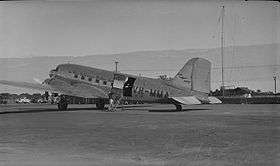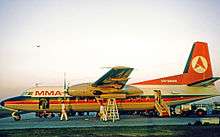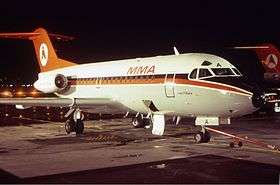MacRobertson Miller Airlines
.gif) | |||||||
| |||||||
| Founded | 1927 | ||||||
|---|---|---|---|---|---|---|---|
| Ceased operations | 1993 | ||||||
| Fleet size | See Aircraft below | ||||||
| Parent company | Ansett Transport Industries | ||||||
| Headquarters | Perth, Western Australia | ||||||
| Key people |
Horrie Miller Macpherson Robertson | ||||||
MacRobertson Miller Airlines (MMA), callsign "Miller", IATA code "MV", was established in Australia in late 1927, by pilot Horrie Miller with the backing of chocolate millionaire Sir Macpherson Robertson.[1]
The airline's initial services were between Adelaide and Broken Hill. The airline grew rapidly and in 1934 transferred its main base to Perth, after winning a Commonwealth Government contract for air services to the north-west of Western Australia and the Northern Territory. The airline has had to endure hardship and cope with long distances in the vast state of Western Australia.
Aircraft
Early aircraft used by the airline included Avro Ansons, de Havilland DH.84 Dragons, Lockheed Model 10 Electras and Douglas DC-3s. Later aircraft included the Fokker F27 Friendship turboprop, a leased Vickers Viscount turboprop, a Douglas DC-9 twinjet leased from Ansett, Piaggios, de Havilland of Canada DHC-6 Twin Otter STOL turboprops, Fokker F28 Fellowship (both 1000 and 4000 series twinjets) and British Aerospace BAe 146 jet aircraft. The airline's Fokkers were amongst the hardest working in the world with some of the highest utilisation rates in the world. MMA's F28s flew the world's longest twinjet route at one stage, and certainly the world's longest F28 flight, Perth to Kununurra. MMA also flew the world's shortest scheduled air service, from Perth to Rottnest Island flying the Douglas DC-3 and later the Fokker F-27 Friendship turboprop airliner. MMA's first Fokker F28 Fellowship was actually leased from Braathens SAFE of Norway (VH-MMJ c/n 11013) and returned to Fokker as PH-ZAH after the first of the ordered aircraft arrived. VH-FKD was originally purchased for Ansett division Airlines of New South Wales but transferred to MMA when it proved uneconomical on the NSW intrastate routes. Ironically this aircraft returned to Airlines of New South Wales service decades later.
- The first F27, VH-MMS, RMA-SWAN, was the 39th of the Fokker production line, but the first F27 in the world to reach 10,000 hours. This aircraft flew an average of 15 hours a day, five days per week to some of the most remote places in the world.
- VH-FKA, RMA Pilbara, was the first Fokker F28 Fellowship in the World to exceed 30,000 hrs and was later re-commissioned by Airlines of New South Wales before returning to Perth. It made its final revenue flight Perth-Port Hedland on 26 May 1995 after over 60,000 hrs. VH-FKA was scrapped at Tullamarine Airport, Melbourne in January 1996.
Corporate history

During 1919, Captain Horatio (later Horace) ‘Horrie’ Clive Miller purchased Armstrong Whitworth F.K.8 G-AUCF from the United Kingdom and eventually launched the Commercial Aviation Company, in Rochester, Victoria. On 8 October 1920, he registered the Commercial Aviation Company. In 1927, the Commercial Aviation Company commenced weekly Adelaide-Mount Gambier services, using Airco D.H.9 G-AUHT.
During late 1927, the MacRobertson-Miller Aviation Co Pty. Ltd. was founded by Horrie C. Miller & Sir MacPherson Robertson, the millionaire confectionery manufacturer. It was not registered until 28 May 1928.
In October 1934, MacRobertson-Miller Aviation transferred its main base to Perth, after it won the Commonwealth Government’s contract for North-West services, previously operated by West Australian Airways

In 1955, MacRobertson-Miller Aviation Co. Pty. Ltd. & Airlines (W.A.) Ltd. were merged, to form MacRobertson Miller Airlines Ltd.,[2] at the request of the State Government.[3] MacRobertson Miller Airlines Ltd. began operations; combining the operations of MacRobertson Miller Aviation Co. Ltd. and Airlines (W.A.) Ltd., over a network of more than 32,000 km, from Esperance in Western Australia to Darwin in the Northern Territory.
On 19 April 1963, Ansett Transport Industries (ATI). purchased Mac.Robertsons Pty Ltd’s 62% share in MMA, plus some 8% of MMA owned by Horrie Miller, via Miller Investments Pty Ltd, to give it 70.49% (654,716 of 953,314 shares) of MMA shares, after MMA, in desperate need of funds for new Fokker F27 Friendship aircraft and planned new jet aircraft, approached Ansett to purchase a major share.
On 1 June 1963, MacRobertson Miller Airlines. was renamed MacRobertson Miller Airline Services & became a division of Ansett Transport Industries.

In 1968 the airline adopted the Ansett "Delta" livery for its company image, introducing the new scheme on its leased Fokker F28 Frienship substituting the name MMA for Ansett on aircraft, vehicles and stationery.
MMA was renamed Airlines of Western Australia in 1981 using a new red and green colour scheme and a stylised kangaroo paw logo (the floral emblem of Western Australia). This scheme was adopted with the introduction of the first of the new Fokker F28 Fellowship 4000 series after Peter Abeles and Rupert Murdoch acquired control of the Ansett Group, as part of a restructuring of the local divisions.
Airlines of Western Australia was then renamed Ansett WA in 1984 and once again it adopted the parent companies livery and image. It was also briefly named Air WA prior to naming it Ansett WA, although this only appeared on a single BAe 146 aircraft which was repainted Ansett WA before entering line service. In 1993 the division was absorbed by Ansett, and any connection with its Western Australian heritage vanished. On 14 September 2001 Ansett collapsed. By the time it became an integral part of the Ansett group, it was Australia’s oldest continually-operating domestic airline, and one of the oldest airlines in the world.
MMA was affectionately referred to by the West Australian locals as "Mickey Mouse Airlines".
MMA operated out of Perth Airport. The main road leading into Perth Airport's International Terminal 1 is named after Horrie Miller.
MMA usually named its aircraft after Western Australian rivers, and the last letter of the aircraft registration reflected this i.e. Fokker F27 "RMA SWAN" had VH-MMS, "RMA ROBE" VH-MMR etc. One exception was Fokker F27 VH-MMU, "RMA MABUHAY", leased from Philippine Airlines. The name meant "welcome" in one of the Filipino dialects.
The F28s were named after Western Australian regions (Pilbara, Kimberley, Goldfields etc.), and the F28s' registrations "FK" prefix reflected the aircraft manufacturer, Fokker. One of the later jets was named after the founder of the airline, Horrie Miller.
Accidents and incidents
- On 1 July 1949, Douglas DC-3 "Fitzroy" on a schedule flight to Darwin and carrying 14 passengers and a crew of 4 crashed after take-off from Perth in heavy rain. The aircraft crashed into an area of disused army huts north of the town of Guildford (a town directly in line with Perth Airport's major runway 21/03). It is believed to have been caused by the aircraft being incorrectly loaded.
- On 31 December 1968, Vickers Viscount "Quininup" VH-RMQ leased from Ansett-ANA broke up in mid-air and crashed 52 kilometres (32 mi) south of Port Hedland Airport in the scrub on Indee Station. 22 passengers and the 4 crew on board were killed. The aircraft was originally purchased by Trans Australia Airlines.[4]
- Fokker F28 Flight MH 372 Perth to Port Hedland - 30 July 1971, VH-FKC: During the long late night hop destination and onward airports became blanketed with fog. The F28 became dangerously low on fuel and after circling for some time Captain Harold Rowell considered ditching the aircraft in the ocean. However, he eventually landed the jet on a gravel runway in the isolated town of Fitzroy Crossing, landing with less than ten minutes of fuel remaining. No life was lost and no injury occurred.
- Fokker F28 Fellowships of MMA assisted with the evacuation of Darwin after Cyclone Tracy in December 1974. One F28-1000 carried 128 evacuees, mostly children, on a flight to Perth, though most aircraft carried 80, 20 more than the standard 60 passengers. The F28s evacuated 1,250 people out of Darwin in four days.
See also
References
- ↑ "Mac Robertson Miller Airline Services". Australian Commercial Aviation Collection. Retrieved 2009-08-15.
- ↑ The Argus - 24 June 1955, p.16 Retrieved 2011-10-26
- ↑ RAAF Association of WA Archived 14 December 2011 at the Wayback Machine. Retrieved 2011-10-26
- ↑ "Accident description". Aviation Safety Network. Retrieved 3 September 2009.
External links
| Wikimedia Commons has media related to Airlines of Western Australia. |